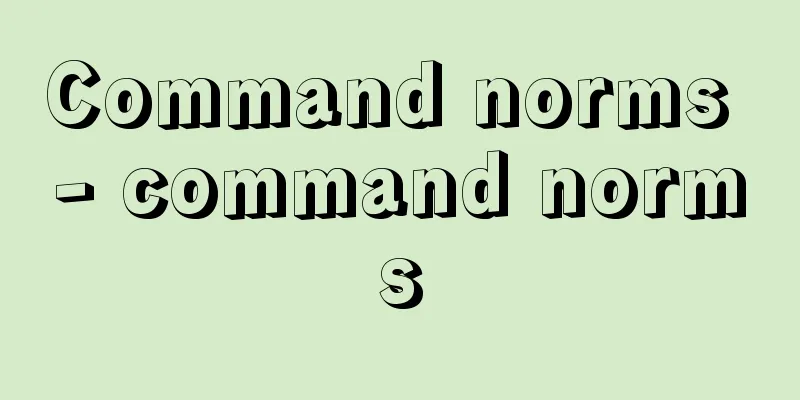Command norms - command norms

|
It simply means a norm that stipulates that a certain thing should or should not be done. It is used in contrast to a "capability norm," which specifies the requirements for legal effectiveness. In other words, legal acts that go against a capacity norm are invalid, whereas acts that go against a command norm may be punished, but the effectiveness of the act is not affected. Police laws and narrowly defined enforcement regulations are examples of this. [Katsuragi Takao] Source: Heibonsha World Encyclopedia, 2nd Edition Information |
|
単にあることをせよ,あるいはしてはならないと規定した規範をいう。法律上の効力要件を定めることを内容とする〈能力規範〉と対比して用いられる。すなわち,能力規範に反する法律行為は無効であるのに対し,命令規範に反する行為は制裁を受けることはあっても,行為の効力に影響はない。警察法規や狭義の取締規定はこの例である。【桂木 隆夫】
出典 株式会社平凡社世界大百科事典 第2版について 情報 |
Recommend
《Moment Preserved》(English) MomentPreserved
...His portraits are gentle yet still permeated w...
Acharaka play - Acharaka play
...The actors included Ikoma Raiyu (1895-1964), Y...
Lambert's law
…The attenuation constant of absorption in a medi...
Analog Servo - Analog Servo
...However, it is difficult to realize a powerful...
Paul Adrien Maurice Dirac
British theoretical physicist. Born in Bristol, h...
"Music News" - Ongaku Shinpo
…In his symphonies, as shown by the examples of “...
Naval Reserve Flag
…The Royal Navy's naval ensign, the White Ens...
《Ezumi ni yugu》 - Dedicated to Ezumi
...American Jewish novelist. Born and raised in N...
Diffuse superficial keratitis
...When exposed to large amounts of ultraviolet l...
Angle of repose
When a pile of powder or granular material is mad...
Chengde - Shoutoku
A prefecture-level city in the north of Hebei Pro...
Heat sink - with burner
A device that discards excess heat. Usually, it r...
Kii Mountains
A mountain range that makes up the Kii Peninsula ...
Work by Rin Akamatsu
Western-style painter. Born in Okayama Prefecture...
Weasel Beetle - Weasel Beetle
A general term for pouched animals belonging to th...






![Iyo [city] - Iyo](/upload/images/67caf2ed20a1d.webp)


